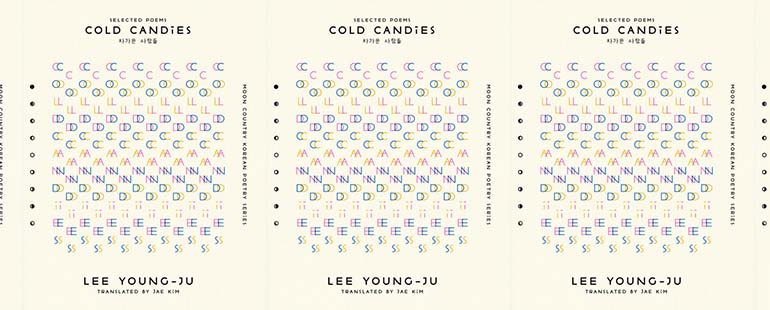Pleasurable Disorientation in Lee Young-ju’s Cold Candies

Cold Candies: Selected Poems of Lee Young-ju
Lee Young-ju
Black Ocean | December 7, 2021
Cold Candies, a new poetry collection by Lee Young-ju, translated from the Korean by National Endowment of the Arts Fellow Jae Kim, is preoccupied with dismemberment. Young-ju’s surreal prose poems break down the human form. Girls without feet float through reservoirs. A dog tears off its own leg. These images of rupture are mirrored by an equally fragmented narrative form: Young-ju rejects linear storytelling, instead creating scenes imbued with intimate uncertainty, and offering the reader looping, dreamlike accounts of womanhood.
Throughout the collection, the moments of bodily destruction are absurd, yet the speaker maintains a captivating nonchalance. For example, the poem “Roommate, Woman” begins with the seemingly impartial claim: “On waking, I see my body has been rearranged.” An intimate “you” then enters the frame, as the speaker claims, “I hold your hand. While we sit on leaking fuel tanks and watch the pale clouds, our joined hands slip on the door.” Nothing spatial is stable. This mutability also permeates relationships: it is unclear if the “you” is a lover, a friend, or the speaker herself. Identity is slippery, implying a resistance to the formation of stagnant characters and prioritizing subjective sensorial experiences.
When specific intimate ties are named, however, they are often subverted. A recurring figure named “sister” appears throughout the poems, but often in a nonhuman form: a bundle of mushrooms is called “sister,” as is a frosted windowpane. Here, Young-ju defamiliarizes the entire concept of sisterly relationality, reinvigorating staid ideas of familial belonging and attributing agency to objects. A standout poem entitled “Lover” similarly traditional sentimental connotations of the term. Instead, Young-ju writes,
Nobody rehearses the future. Cold fluid enters through touch. The proteins in our arms, which melt like steel beams in the rain, turn into some other matter in front of a mirror . . . .
The business of liking someone is always haunted by a dark aura.
Here, love becomes a catalyst for decomposition, literally dissolving the speaker and the love object on a molecular level. Young-ju’s nod to the identity-loss that accompanies romantic attachments is refreshingly apt, providing a scene of joint destruction that counters utopian love plots. In these poems, the speaker’s selfhood is not safe, but there is a quiet wonder to her cycles of breakage and reconstitution, shown repeatedly in dense blocks of text. Young-ju’s poems rarely deviate from paragraph form, generating an uncanny sense of repetition that mirrors much of the anxiety her work explores.
In this anxiety comes one of the collection’s major strengths: its preoccupation with uncertainty. The poems are deeply engaged in the poetics of question-asking. Young-ju’s questions provide the reader with a helpful variance, dotting the poems with rhetorical turns. The speaker’s constant questioning also highlights her own fluid relationship to the narrative form. In the poem “Intimately,” she asks, “How do I catch the woman’s name when it shape-shifts every day?” And later, in a poem entitled “The Ritual to Come of Age: “Is every history made false the moment it’s told?” Young-ju’s staunch refusal of the didactic can make the collection challenging, but this rejection of moralism or universal truth is critical.
The collection walks the line between genres, and in his thoughtful introduction, Kim places her writing in a lineage of hybrid texts that includes Yasunari Kawabata’s Palm-of-the-Hand Stories and Renee Gladman’s Calamities. To this list one might add Clarice Lispector’s Agua Viva and Danielle Dutton’s SPRAWL: like the narrators of these texts, Cold Candies’ unnamed speaker confidently rejects plot and defamiliarizes the routines of the domestic sphere. Agua Viva famously opens with the outlandish claim “I want to eat straight from the placenta.” Young-ju’s speaker shares a preoccupation with transgressive consumption: in an early poem entitled “Happy Funeral,” she claims, “The cat resembles a fat mouse, and I want to eat it. I want to eat my likeness.” Again, we see a complex network of relations, with the speaker wanting to destroy the household symbol of the cat, which she equates with herself.
At its core, Cold Candies is a study of the human mind, with all its surreal associations and unexcavated corners. The experience of reading is like watching the machinations of someone’s brain: witnessing the desire for destruction delicately entangled with the desire for pleasure, and the absurd imagery that surfaces when we are freed from narrative obligations. In the poem “If You are Carnivorous,” she writes, “We felt flesh and found ourselves in a moment we weren’t used to.” The experience of reading Cold Candies is similar: finding oneself suspended in an unfamiliar zone, and the disorientation is pleasurable.


